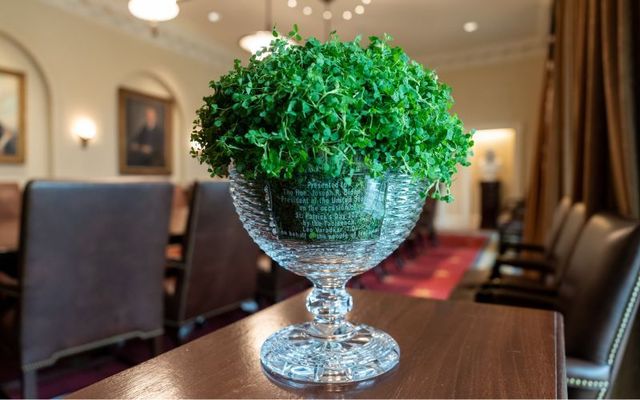The tradition of the sitting Taoiseach presenting the sitting US President with a bowl of shamrock at The White House to mark St. Patrick's Day has origins in the Truman era.
In 1952, Ireland’s Ambassador to the US John Hearne sent a small box of shamrock to US President Harry Truman.
Truman was out of town at the time, but he later sent Ambassador Hearne a message in which he said that he hoped "relations between the two countries will continue to be on a good and effective level for generations."
Hearne unknowingly created an Irish American tradition that is still embraced, albeit in an evolved form, decades later.
In 2010, Michael Kennedy, the executive editor of Ireland's "Documents on Irish Foreign Policy" project, explained to CNN how Ambassador Hearne's shamrock gesture "moved St. Patrick's Day up the political agenda and brought it from Irish-America to all of America."
Kennedy reasoned that, at the time, Ireland "wanted to restore and reinforce her pro-Western credentials with Washington."
He added: "I think Hearne had Cold War politics and alignment, as well as serving the Irish diaspora, in mind."
The shamrock ceremony slowly evolved, but by the time John F. Kennedy - the first Irish American Catholic President of the United States - was in the White House, it became a "full-blown media event."
During the Nixon era, the shamrock ceremony "took on a new political significance" against the backdrop of The Troubles and, as CNN notes, "Ireland's annual audience with the US president became an important way to cultivate a strong transatlantic relationship."
During the Ford and Carter years, the shamrock ceremony became a bit more "routine," but Irish American Ronald Reagan's arrival in the White House "helped transform St. Patrick's Day in Washington into a jovial, celebratory, all-day affair."
It was during the Reagan era that Speaker of the House Tip O'Neill hosted the first congressional St. Patrick's Day luncheon in the U.S. Capitol; the luncheon continues today under the auspices of the bipartisan Friends of Ireland Caucus.
George HW Bush continued with the shamrock ceremony, but as CNN notes, Bill Clinton "took the ceremony to a new level" - he set a precedent by meeting only with the Taoiseach, "not lower-ranked shamrock-bearers."
Clinton began to host "lavish" St. Patrick's Day receptions, with Northern Ireland's politicians invited. His efforts, according to CNN, helped lead to the Good Friday Agreement.
Clinton's predecessor George W. Bush, however, attempted to tone down the St. Patrick's Day events "as a way of signaling his intention to limit his administration's involvement with Northern Ireland."
After Bush, Obama "made clear his commitment to continuing the ritual, calling it 'an affirmation of one of the strongest bonds between peoples that exist in the world.'"
The shamrock ceremony continued throughout the Trump years. However, in 2020, the shamrock ceremony was nixed due to the onset of the Covid pandemic. The same day it was announced the shamrock ceremony would be a no-go, Taoiseach Leo Varadkar announced - from Washington, DC - that Ireland would be shutting down due to the pandemic.
In 2021, the ceremony went virtual in light of the pandemic, Taoiseach Micheál Martin had a virtual meeting with US President Joe Biden, who regularly touts his own Irish roots.
Things were almost back to normal in 2022 when Martin was in Washington, DC to attend St. Patrick's Day events, only to test positive for Covid the night before the shamrock presentation ceremony, again forcing his engagement with Biden to be held virtually.
In 2023, things were finally back to normal when Taoiseach Leo Varadkar was able to present Biden with a crystal bowl of shamrocks - in person - during a reception at the White House. (Biden made an official visit to Ireland about a month later.)
The tradition of presenting a bowl of shamrock to the US President for St. Patrick's Day is set to continue this year when Taoiseach Leo Varadkar again visits President Joe Biden in Washington, DC.
However, some are calling for this year's visit to be boycotted in response to the US response to the war in Gaza. Varadkar, however, said it would be a "big mistake" to nix the event.
* Originally published in 2016. Last updated in March 2024.




Comments